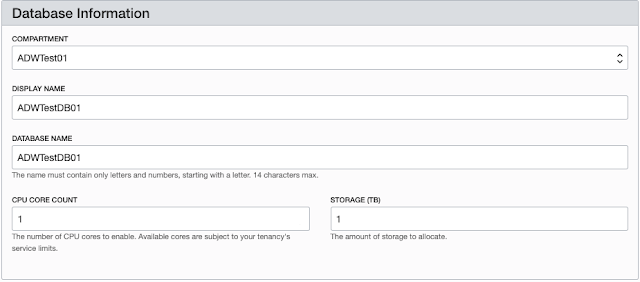Oracle Autonomous Data Warehouse – What is it?
Oracle
Autonomous Data Warehouse (ADW) is one of the so-called DB as a Service DBaaS
or probably we should call it Data Warehouse as a Service DWaaS with the
difference that this service is completely automatic and autonomous.
This
service is comprised by an Oracle Database (of course) already pre-configured
for analytics, data lakes and data warehouse workloads. This Oracle Database (PDB)
has 18c features running on Exadata hardware. Oracle Exadata software is 18c
with features like In-Memory delivered from the cell server.
There’s
a service console that helps to manage the ADW services. On top of this,
Machine Learning (ML) tools help with data analysis and data models.
Development
tools like SQL Developer are useful to create objects, load data and more.
Let now
talk about tasks that happen automatically:
Automatic
statistics gathering during direct-path load operations
Automatic
tuning
Automatic
Partitioning
Automatic
In-Memory
Automatic
Indexing (soon)
Automatic
Compression
Automatic
Tablespace Management
Automated
backups and patching
ADW is
also capable of repair itself. Machine Learning is used to detect anomalies and
uses pattern recognition to determine if this problem is already in the problem
knowledge-base. If is a known problem, it will apply the fix automatically.
On the
security side all the information is encrypted at rest. This means that backups
and all data in the tablespaces is encrypted using TDE. The connectivity
between ADW and the rest of the world is secured be default. Oracle provides a
wallet file that contains all the connectivity information required to login.
If you open this file you’ll notice that all connectivity is being done through
SSL.
(security=(ssl_server_cert_dn=…
Provisioning
is quite easy using the service console.
From the
main dashboard you can click on “Create a data warehouse” button.
Select
the Workload type between Autonomous Data Warehouse ADW or Autonomous Transaction
Processing ATP loads.
Next you
choose a compartment where the ADW database is going to live. For this example I’m
going to choose ADWTest01 compartment. It is not recommended to use the root
compartment.
Then we
are going to set the Display and Database names. For this example, I’m choosing
1 OCPU and 1 TB of storage. Keep in mind that ADW is elastic, this means we can
add more OCPUs and Storage on the fly without the need for downtime.
From the
Administrator Credentials section we are going to set the ADMIN account
password.
Next is
license type. You can choose to use a license that you already own or subscribe
to a new one.
Last but
not least is the Tags section. You can add a tag to this ADW database to better
manage it inside your tenancy.
Let’s
now click Create Autonomous Database and wait few minutes for OCI to provision
it.
The
orange ADW icon will turn green once the ADW database is fully provisioned.
In my
next post I’ll cover how to connect o the ADW database and how to load data to
it.
Thanks,
Alfredo










